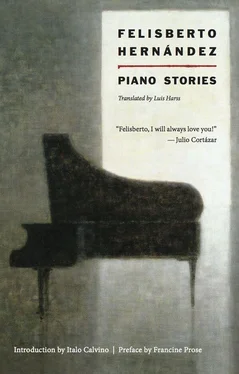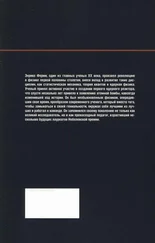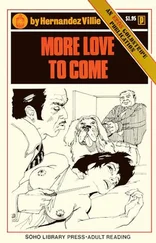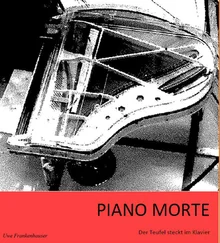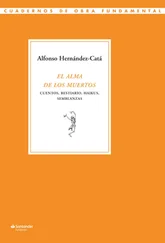Felisberto Hernandez - Piano Stories
Здесь есть возможность читать онлайн «Felisberto Hernandez - Piano Stories» весь текст электронной книги совершенно бесплатно (целиком полную версию без сокращений). В некоторых случаях можно слушать аудио, скачать через торрент в формате fb2 и присутствует краткое содержание. Год выпуска: 2014, Издательство: New Directions, Жанр: Современная проза, на английском языке. Описание произведения, (предисловие) а так же отзывы посетителей доступны на портале библиотеки ЛибКат.
- Название:Piano Stories
- Автор:
- Издательство:New Directions
- Жанр:
- Год:2014
- ISBN:нет данных
- Рейтинг книги:4 / 5. Голосов: 1
-
Избранное:Добавить в избранное
- Отзывы:
-
Ваша оценка:
- 80
- 1
- 2
- 3
- 4
- 5
Piano Stories: краткое содержание, описание и аннотация
Предлагаем к чтению аннотацию, описание, краткое содержание или предисловие (зависит от того, что написал сам автор книги «Piano Stories»). Если вы не нашли необходимую информацию о книге — напишите в комментариях, мы постараемся отыскать её.
Piano Stories
Piano Stories — читать онлайн бесплатно полную книгу (весь текст) целиком
Ниже представлен текст книги, разбитый по страницам. Система сохранения места последней прочитанной страницы, позволяет с удобством читать онлайн бесплатно книгу «Piano Stories», без необходимости каждый раз заново искать на чём Вы остановились. Поставьте закладку, и сможете в любой момент перейти на страницу, на которой закончили чтение.
Интервал:
Закладка:
About an hour had gone by since their return from the garden when Mary started looking around for Horace and found him back in the show room with the boys. She was pale, and everyone realized something serious had happened. She had the boys excuse Horace and led him up to the bedroom. There he found Daisy with a knife stuck under one breast. The wound was leaking hot water down her dress, which was soaked, and dripping on the floor. She was in her usual chair, with big open eyes. But when Mary touched her arm she felt it going cold.
Collapsing into Horace’s arms, Mary burst out crying:
“Who could have dared to come up here and do such a thing?”
After a while she calmed down and sat in a chair to think what was to be done. Then she said:
“I’m going to call the police.”
“You’re out of your mind,” he said. “We can’t offend all our guests just because one of them misbehaved. And what will you tell the police? That someone stuck a knife in a doll and that she’s leaking? Let’s keep this to ourselves. One has to accept setbacks with dignity. We’ll send her in for repairs and forget about it.”
“Not if I can help it,” said Mary. “I’m going to call a private detective. Don’t let anyone touch her — the fingerprints must be on the knife.”
Horace tried to reason with her, reminding her the guests were waiting downstairs. They agreed to lock the doll in, as she was. But, the moment Mary had left the room, he took out his handkerchief, soaked it in bleach, and wiped off the handle of the knife.
IV
Horace had managed to convince Mary to say nothing about the wounded doll. The day Frank came for her, he brought his mistress, Louise. She and Mary went into the dining room, where their voices soon mixed like twittering birds in connecting cages: they were used to talking and listening at the same time.
Meantime, Horace and Frank shut themselves in the study. They spoke one at a time, in undertones, as if taking turns at drinking from a jug.
Horace said, “I was the one who stuck the knife in her so I’d have an excuse to send her in to you. . without going into explanations.” And they stood there in silence, with their heads bowed.
Mary was curious to know what they were discussing. Deserting Louise for a minute, she went to put her ear to the study door. She thought he recognized her husband’s voice, but it sounded hoarse and blurred. (At that moment, still mumbling into his chin, Horace was saying, “It may be crazy, but I’ve heard of sculptors falling in love with their statues.”) In a while, Mary went back to listen again, but she could only make out the word “possible,” pronounced first by her husband, then by Frank. (In fact, Horace had just said: “It must be possible,” and Frank had answered, “If it’s possible, I’ll do it.”)
One afternoon, a few days later, Mary realized Horace was acting strangely. He would linger over her, with fond eyes, then abruptly draw back, looking worried. As he crossed the courtyard at one point, she called after him, went out to meet him and, putting her arms around his neck, said:
“Horace, you can’t fool me. I know what’s on your mind.”
“What?” he said, staring wildly.
“It’s Daisy.”
He turned pale:
“Whatever gave you that idea?”
He was surprised that she did not laugh at his odd tone.
“Oh, come on, darling. . After all, she’s like a daughter to us by now,” Mary insisted.
He let his eyes dwell on her face, and with them his thoughts, going over each of her features as if reviewing every corner of a place he had visited daily through many long happy years. Then, breaking away, he went and sat in the little parlor to think about what had just happened. His first reaction, when he suspected his wife had found him out, had been to assume she would forgive him. But then, observing her smile, he had realized it was madness to suppose she could imagine, let alone forgive, such a sin. Her face had been like a peaceful landscape, with a bit of golden evening glow on one cheek, the other shaded by the small mound of her nose. He had thought of all the good left in the innocence of the world and the habit of love, and the tenderness with which he always came back to her face after his adventures with the dolls. But in time, when she discovered not only the abysmal nature of his more than fatherly affection for Daisy but also the care with which he had gone about organizing his betrayal, her face and all its features would be devastated. She would never be able to understand the sudden evil in the world and in the habit of love, or feel anything but horror at the sight of him.
So he had stood there, gazing at a spot of sun on his coat sleeve. As he withdrew his arm, the spot had shifted, like a taint, to her dress. Then, heading for the little parlor, he had felt his twisted insides lump and sag, like dead weights. Now he sat on a small bench, thinking he was unworthy of being received into the lap of a family armchair, and he felt as uncomfortable as if he had sat on a child. He hardly recognized the stranger in himself, disillusioned at being made of such base metal. But, to his surprise, a bit later, in bed with the covers pulled up over his ears, he went straight to sleep.
Mary was on the phone to Frank, saying:
“Listen, Frank, you’d better hurry with Daisy. Horace is worrying himself sick.”
Frank said:
“I have to tell you, Mary, it’s a bad wound, right in the middle of the circulatory system. We can’t rush it. But I’ll do my best, I promise.”
In a while, Horace woke up under his pile of blankets. He found himself blinking down a kind of slope, toward the foot of the bed, and saw a picture of his parents on the far wall. They had died in an epidemic when he was a child. He felt they had cheated him: he was like a chest they had left full of dirty rags instead of riches, fleeing like thieves in the dark before he could grow up and expose the fraud. But then he was ashamed of these monstrous thoughts.
At dinner, he tried to be on his best behavior.
Mary said:
“I called Frank about hurrying Daisy.”
If only she had known the madness and betrayal she was contributing to by hastening his pleasure! he thought, blindly casting right and left, like a horse trying to butt its way out.
“Looking for something?” asked Mary.
“No, here it is,” he said, reaching for the mustard.
She decided that if he had not seen it standing there in front of him, he must not be well.
Afterward he got up and slowly bent over her, until his lips grazed her cheek. The kiss seemed to have dropped by parachute, onto a plain not yet touched by grief.
That night, in the first glass case, there was a doll seated on a lawn, surrounded by huge sponges, which she seemed to think were flowers. He did not feel like guessing her fate, so he opened the drawer with the captions and read: “This woman is sick in the head. No one has been able to find out why she loves sponges.” “That’s what I pay them for, to find out,” he said to himself, and then, bitterly: “The sponges must be to wipe away her guilt.”
In the morning he woke up rolled into a ball and remembered the person he had become. It seemed to him even his name had changed, and if he signed a check it would bounce. His body was sad, as it had been once before, when a doctor told him he had thin blood and a small heart. But that other time he had gotten over the sadness. Now he stretched his legs and thought: “Formerly, when I was young, I had far stronger defenses against guilt: I cared much less about hurting others. Am I getting weak with age? No, it’s more like a late flowering of love and shame.” He got up, feeling better. But he knew the dark clouds of guilt were just over the horizon, and that they would be back with night.
Читать дальшеИнтервал:
Закладка:
Похожие книги на «Piano Stories»
Представляем Вашему вниманию похожие книги на «Piano Stories» списком для выбора. Мы отобрали схожую по названию и смыслу литературу в надежде предоставить читателям больше вариантов отыскать новые, интересные, ещё непрочитанные произведения.
Обсуждение, отзывы о книге «Piano Stories» и просто собственные мнения читателей. Оставьте ваши комментарии, напишите, что Вы думаете о произведении, его смысле или главных героях. Укажите что конкретно понравилось, а что нет, и почему Вы так считаете.
